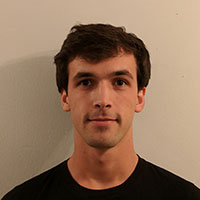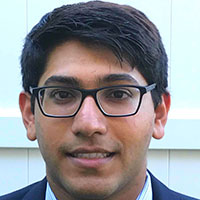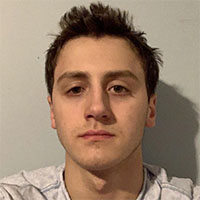General
Office hours:
Here is a calendar of all the office hours that the course staff offer. If you would like to speak to an instructor and you cannot make it to their office hours, send an email to set up a meeting. If you have a general question and cannot make it to anyone’s office hours, post to Piazza (see below).
For the most part, office hours are in ISEC, and staff members will have the same office hours every week. Before going to someone’s hours, check where they will be on the calendar below. Should there be a change to someone’s hours, there will be a post on Piazza and the calendar will be updated.
People
Instructors:
|
|
|
TAs:
|
|
|
|
|
|
|
|
Your TAs and tutors help run the labs, help grade the exams, and hold office hours. In general, they are apprentice teachers and are here to learn how to run a course. At the same time, though, they are your peers who have taken the course, and can see your problems from your perspective.
Tutors:
|
|
|
|
|
|
|
|
|
|
|
|
|
|
|
|
|
|
|
|
|
|
|
Your tutors help run the labs, grade the homework sets, and hold office hours. In general, they are people who are interested in helping others learn, and they are your peers who have taken the course, and can see your problems from your perspective.
Communications
If you need help, you may talk to any of the instructors, the TAs or tutors during their office hours.
Use NEU email (@husky.neu.edu) to reach any of the course staff; usernames are given above. Use @ccs.neu.edu to reach instructors.
Piazza is an on-line forum for class discussions. Anybody can post a question and anybody else can reply. (Please do not post grading questions to Piazza. It’s best to email the grader instead for those kinds of questions.)
Before posting, check whether or not your question has already been asked. If it already has been asked and has not yet been answered, provided the question is not more than a day old, it likely will be answered soon. Do not double post.
Posting any parts of a solution to any parts of a homework assignment is considered cheating. You don’t want to do this. Limit your answers to other students to providing clarity when needed and hints when appropriate. This is good practice should you ever want to be a tutor :)
Note: anonymity on Piazza is implemented to make you anonymous to students but not to staff members.
General Policies
Late assignment policy: An assignment that is one second late is automatically counted as a full day late. Late assignments will be accepted up to three days late, with a 25% penalty per day. Speak to the professors in advance of a deadline if you cannot complete an assignment on time.
Laptop policy: No laptops in class.
Academic honesty: We will strictly enforce Northeastern’s academic integrity policy. You may discuss problems with other students, but you may not share or show code to anyone other than your assigned partner or the course staff. Violations of academic integrity will be reported to OSCCR and will have a negative impact on your grade.
Lectures
Section 1: Mon, Tues, Wed and Thurs at 11:40am–1:20pm
Richards 236 Shesh
Section 2: Mon, Tues, Wed and Thurs at 1:30–3:10 pm
Hurtig 129 Razzaq
Lectures policy:
You are required to read the lecture material for the given lecture before coming to class. During the lectures we will discuss the material covered in the required reading, answer questions, provide additional examples and applications.
It is OK if you do not understand everything when you first read it, but reading about the new concept ahead of the time will give you a chance to anticipate the questions you may have and allow you to follow better the details of explanation during the lectures.
Labs
Tuesdays at 8:00am-9:40am in WVH 210
TA: Manas PurohitTuesdays at 9:50am-11:30am in WVH 210
TA: Kathryn StavishTuesdays at 9:50am-11:30am in WVH 212
TA: Samuel SiegmeisterTuesdays at 11:45am-1:25pm in WVH 210
TA: Kathryn StavishTuesdays at 11:45am-1:25pm in WVH 212
TA: Matthew SingerTuesdays at 1:35pm-3:15pm in WVH 212
TA: Bahar Haji-SheikhiTuesdays at 3:25pm-5:05pm in WVH 212
TA: Lisa GaoTuesdays at 5:15pm-6:55pm in WVH 210
TA: Li BreiteTuesdays at 5:15pm-6:55pm in WVH 212
TA: David ThorntonTuesdays at 7:05pm-8:45pm in WVH 212
TA: Brandon Klein
Labs policy
The goal of the labs is to see in practice problems that illustrate the concepts covered in the lectures, and to prepare you for the next programming assignment.
There is a lot of technical detail related to running Java programs that will be covered in the early labs. Later labs will focus more on design questions and on good Java programming practice.
In-lab Quizzes and Code review
We will be running quizzes during several of the labs, possibly without prior warning. The goal of the quizzes is to see that you are familiar with the most basic concepts covered during the recent lectures, labs, and assignments.
Quizzes will be graded, and are counted as part of your exam scores (see Exams below). The intent is to assess your progress in the course in smaller chunks rather than just through lengthy midterm exams.
If you do not pass the quiz, you need to meet with the instructor within the next week, to identify the problems you may have and to help you get back on track. Only one makeup of a lab quiz will be allowed.
We may also be conducting code reviews in labs, of either the material from that lab or from the prior week’s homework. As presenters, be prepared to explain your design choices to your classmates. As reviewers, pay attention both to how the presenters organize their explanations and how they organize their code, and feel free to ask clarifying questions about either.
Computing Environment
You will complete your assignments (other than the first one) using the Eclipse IDE. Though, if you feel more comfortable, you may choose to use another IDE (e.g. NetBeans) or work directly from the command line, but you and your partner must both be comfortable with the chosen programming environment, and the staff may not be able to assist you with issues encountered in other environments.
You will use the handin server to submit your homework. You may submit as many times as you wish, though submitting too frequently will be detected and rate-limited, to ensure fairness for other students. Be aware that close to the deadline when everyone submits all at once, the server will become less responsive.
Assignments
There will be one problem set each week. As with CS2500, the problem sets will include finger exercises and practice problems, that you are strongly encouraged to look at and confirm that you can solve. You are welcome to bring solutions to these problems to the course staff during the semester for informal feedback on how you’re doing.
The graded problems are to be solved collaboratively with your partner. The problems will consist of structured programming assignments that may be based on the work done in previous weeks, and may also include more creative projects where you can practice your design skills.
Due Dates: Thursdays at 11:00pm, unless otherwise specified. See the late policy above.
Note: unlike last semester, you will submit each problem separately on the handin server. This is for your benefit: the server will attempt to compile and run your program against automated test cases. Having separate submissions for each problem means that a syntax error in one problem won’t immediately prevent your other problems from compiler also. Be careful to submit the correct answers to the correct problems.
Pair Programming
You must work on problem sets in pairs. We will assign you a partner. You will switch partners a few times during the semester.
Important Pair programming means that you and your partner work on the problem sets jointly. You read them together and you work on the solutions together. One of the lab’s purposes is to teach you how to work in pairs effectively; indeed, pairs are provably more effective than individuals in programming. The rough idea is this: One of you plays pilot, the other co-pilot. The pilot works on the keyboard and explains aloud what is going on; it is the co-pilot’s responsibility to question everything. After a problem is solved to the satisfaction of both, you must switch roles.
Every partner must be able to solve every homework problem in the end. In other words, you must be able to solve every homework problem on your own.
If you are having difficulties working with your partner, please inform your lab TA or your instructor quickly: we cannot help if we don’t know there’s a problem.
Academic Integrity
All programs must be completed strictly by you and your partner. You are free to discuss the problem sets with others, so long as you acknowledge (in comments, in your submitted files) whoever you discussed the problem with. However, you may not share code in any way. Submitting code that is not your own will be considered a violation of the University’s Academic Integrity Policy (page 40 of the 2016-2017 Underaduate Student Handbook). Violations of academic integrity will be reported to OSCCR, and will have strong consequences on your grade, from an automatic zero on the assignment to failing the course.
NOTE: Be aware that while submitting someone else’s code is clearly a violation, so is sharing your code with others, even if you truly just mean to help. Outside an academic environment, sharing code with unauthorized parties can be a criminal offense and have severe and unanticipated consequences.
If you are ever unsure of whether sharing is unacceptable or not, ask one of the course staff.
Exams
You may bring one sheet of notes to exams (may be typed or hand-written, one-sided or double-sided).
Midterm 1: Wednesday, February 13, 6-9pm. Rooms posted to Piazza
Midterm 2: Wednesday, March 27, 6-9pm. Rooms to be determined
Grades
40% homework. Most homeworks will be equally weighted, but larger projects and will take more time and will be weighted more.
50% exams, with exact proportions to be determined.
10% quizzes/classwork/participation, meaning active participation in class and lab
As before, you can use the handin server to see the current weights of each assignment, and your approximate grade in the course so far. The exact weights of assignments, quizzes and exams will change during the semester, depending on exactly how many of each we have. We will let you know when we update these weights, and will try to keep it as infrequent as possible.




























